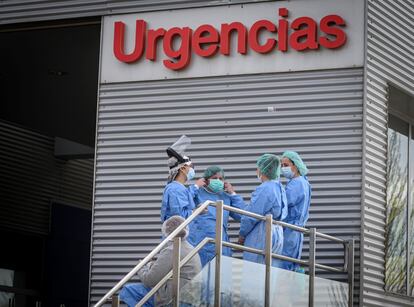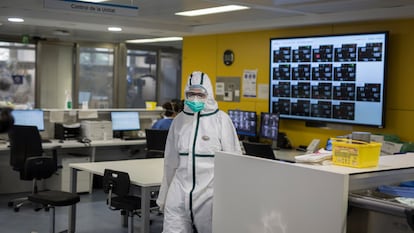Daily coronavirus deaths in Spain fall to 517
Although the figures continue to fluctuate, authorities maintain that the outbreak is on a downward trend

Spain’s daily death toll from the coronavirus stood at 517 on Monday morning, according to figures released by the Health Ministry.
This is a fall on Sunday’s figures, when there were 619 fatalities, and appears to confirm a downward trend following the April 2 peak of 950 reported deaths. The total of coronavirus-related victims came in at 510 on Saturday and 605 on Friday.
The number of new infections rose by 2% of the total since Sunday, while fatalities increased by 3% in the 24-hour period. These are the lowest figures Spain has seen since the beginning of the coronavirus outbreak.
There has been a total of 17,489 Covid-19-related deaths in Spain since the epidemic began, and there have been 169,496 confirmed cases. Spanish health officials also reported that 64,727 people have recovered from the disease and have been discharged from hospital.
Although these figures should be taken with some caution, given that since the start of the crisis, data has been underreported on weekends and on public holidays, they confirm a downward trend following the April 2 peak of fatalities. When compared with last week’s figures from Monday and Sunday, they indicate a drop of 13% in daily fatalities.
It is also widely believed that the real figures are higher, as only people who have been tested for the coronavirus are being included in the official tally. This leaves out individuals with symptoms who die in their homes or at senior residences without ever getting tested.
Madrid continues to be the worst-affected region in Spain, with a total of 47,146 confirmed cases and 6,432 deaths, followed by Catalonia with 34,726 infections and 3,538 fatalities
The number of new infections has also fallen sharply. In the last 24 hours, there were 3,477 new cases – the lowest number since March 19. This figure represents just over one third of the number that was seen during the peak of the epidemic. The number of new cases reported on Monday is also 25% lower than the figure reported one week ago.
Madrid continues to be the worst-affected region in Spain, with a total of 47,146 confirmed cases and 6,432 deaths, followed by Catalonia with 34,726 infections and 3,538 fatalities.
Last week, the Health Ministry stopped reporting on the number of coronavirus patients in intensive care units (ICUs), given that not all regions count the figure the same way. The region of Madrid has, however, provided details on ICU patients. According to the latest figures, as of Monday there were 1,332 patients currently in intensive care, 44 fewer than on Sunday.
The region also reported the lowest number of new cases in a month with 559 new infections, according to the Health Ministry. A total of 25,385 people have now recovered from the disease in Madrid, which represents nearly 54% of all cases in the region.
Speaking at the daily press briefing on the coronavirus crisis on Monday, Dr María José Sierra from the Health Ministry’s Coordination Center for Health Alerts said the figures “confirm the downward trend” of the outbreak.
Face masks on public transport

The Interior Ministry began on Monday to distribute face masks to passengers on public transport. Up to 10 million face masks will be handed out at Metro, bus and train stations on Monday and Tuesday, when Spain’s non-essential workers, from sectors such as construction and industry, are expected to return to work. The eased conditions do not extend to retail stores, business specializing in entertainment and leisure, or to bars and restaurants (except those offering home delivery).
The government’s decision to end the two-week “hibernation” period that suspended all non-essential activity has raised concern in Spain of a new spike in coronavirus cases. Amid these concerns, the Health Ministry published a guide on Saturday with recommendations for businesses and workers on how to avoid contagion. Included on the list is the use of hygienic or barrier masks on public transport. This type of mask is different to the surgical mask typically used by health staff, and the filter mask, which is necessary for those who deal with the sick.
“The use of masks is recommended when one is unable to remain at a social distance of two meters,” explained Interior Minister Fernando Grande-Marlaska in an interview with the radio station Cadena SER on Monday morning. “The government is working so that by the end of the week there is no shortage of masks in pharmacies,” he added.
Speaking to Spain’s national RNE radio network on Monday, Transport Minister José Luis Ábalos said that “the activity that can be undertaken under the state of alarm is very limited. In any case, the hygienic measures must be strengthened.”
According to figures from Madrid’s Metro system, there was a 34% rise in commuters on Monday by 8am compared with March 30, when the halt on non-essential activity came into effect.
Health worker deaths

According to the Medical Association of Madrid, 23 doctors have died from coronavirus since the beginning of the crisis. In a press release issued on Sunday to mark the International Day for Primary Healthcare, the association called for more personal protective equipment for health workers and for more testing to be done on professionals in the sector. The press release added that the current organization “is not effective for the epidemiological control of the disease.”
Lockdown in the Balearic Islands
The premier of Spain’s Balearic Islands, Francina Armengol, indicated on Sunday that the archipelago’s port and airports will be “the last” to reopen when the lockdown restrictions are eased. Following the weekly video conference between Pedro Sánchez and regional leaders, Armengol said that the shutdown of air and sea connections had been key to protecting the region from the coronavirus outbreak. As of Sunday, there were 1,534 confirmed coronavirus cases in the Balearic Islands and 112 deaths, one of the lowest figures in Spain.
This is a breaking story and will be updated shortly. Please refresh your browser.
English version by Melissa Kitson.








































